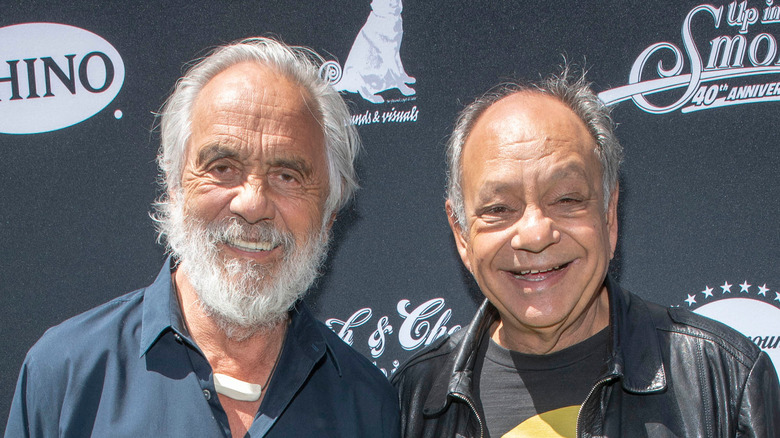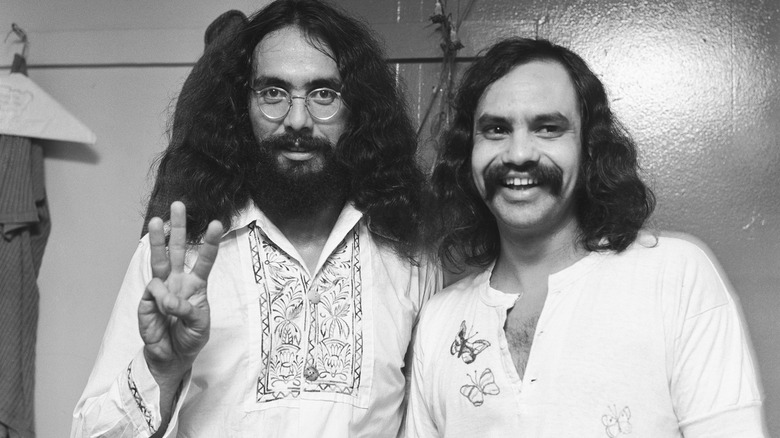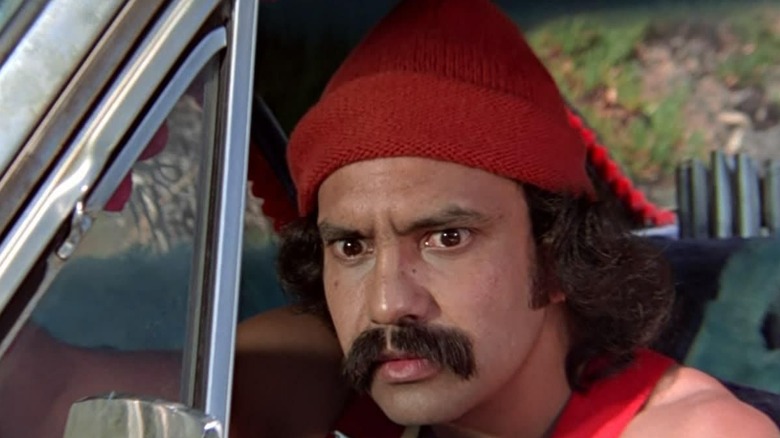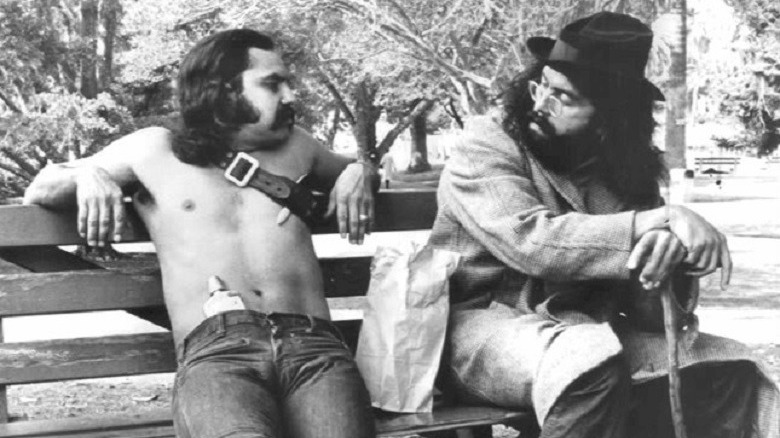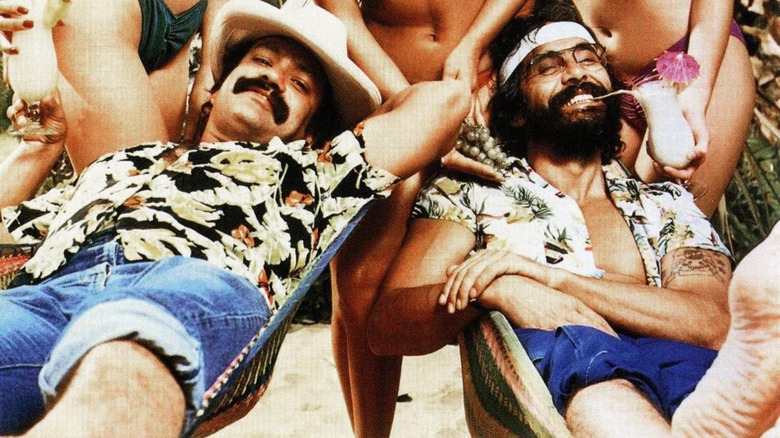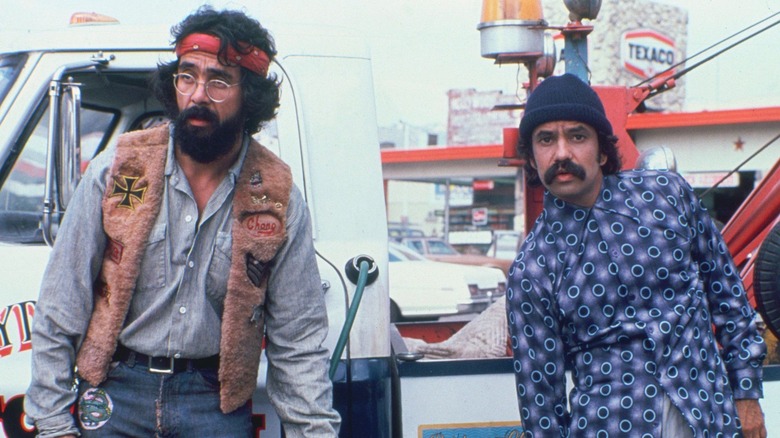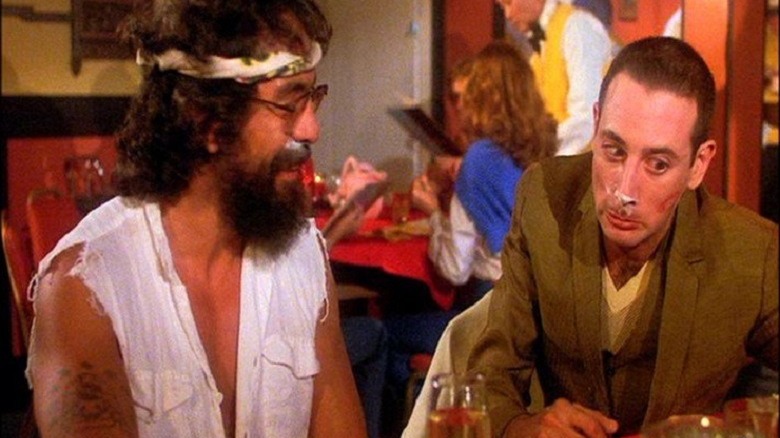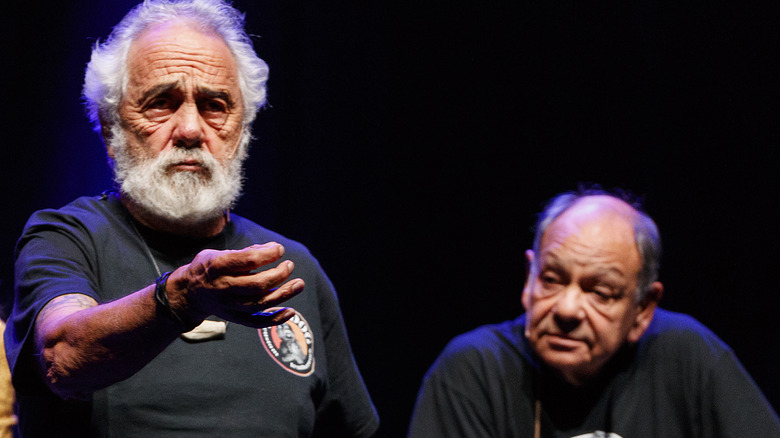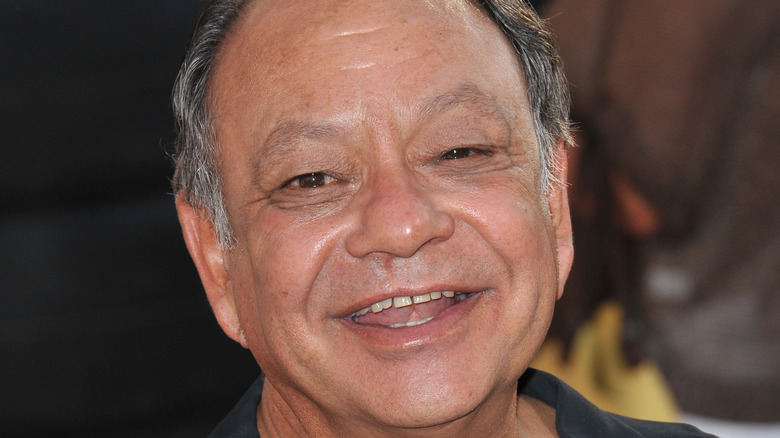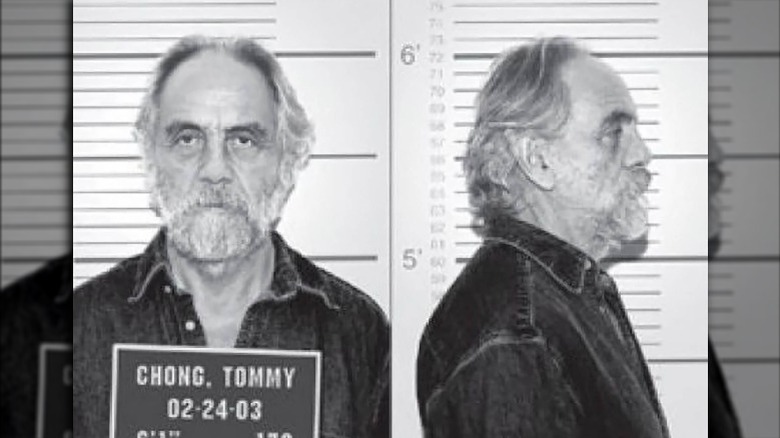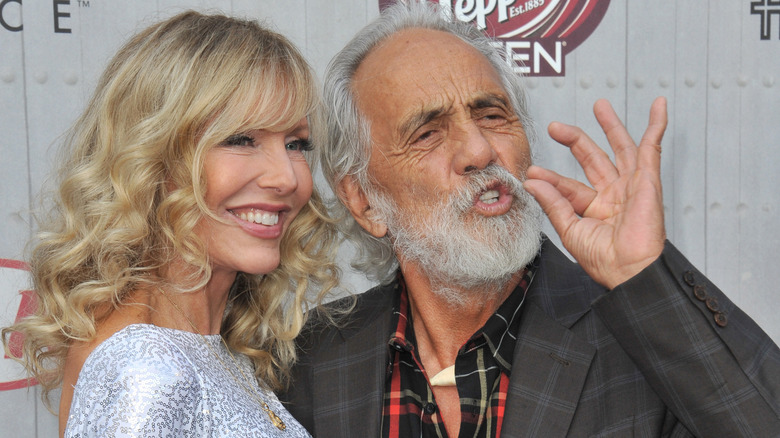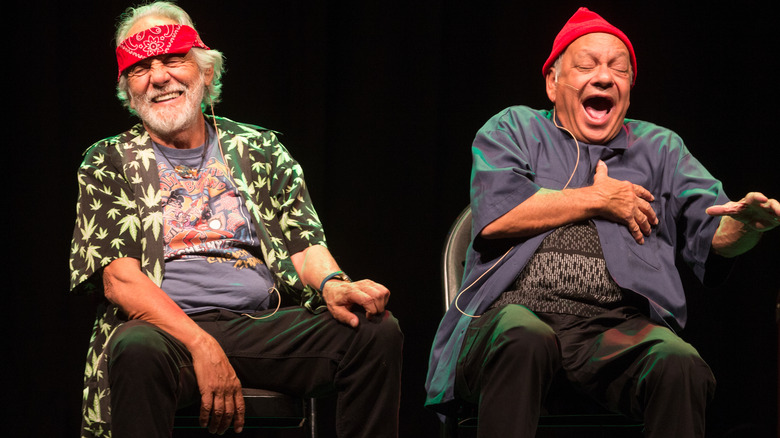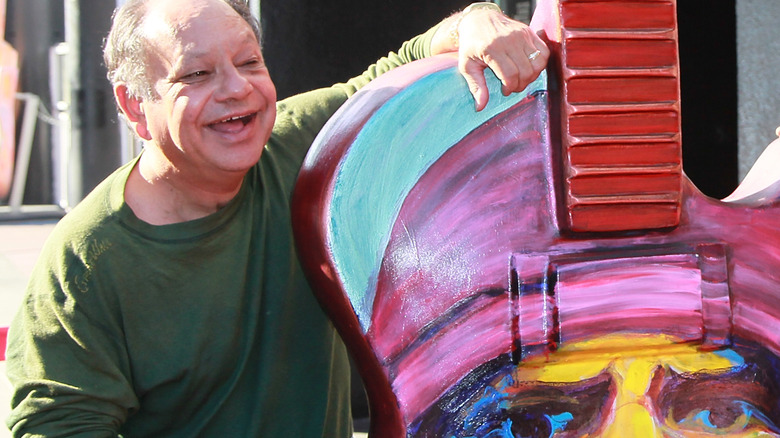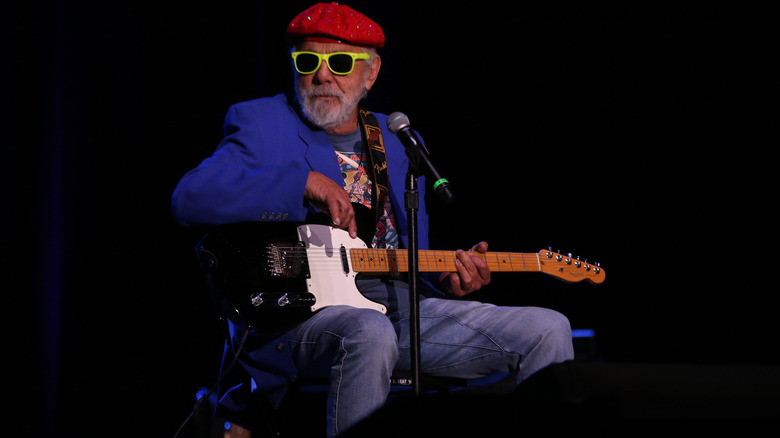What You Don't Know About Cheech & Chong
During the late '70s, Richard "Cheech" Marin and Tommy Chong took the world by storm with their comedy act, which unabashedly pushed taboos and laughed at Uncle Sam's overly straight laces. Parents were offended, the youth of the day identified with the duo's counterculture shtick, and money was made. In the process, they launched a whole new genre of stoner comedy films, paving the way for later movies like "Jay and Silent Bob," "Harold and Kumar," and "Pineapple Express."
Although they are most known for jokes about marijuana and "Dave not being here," Chong and Marin managed to create legacies transcending their dropout stoner caricatures. They've both overcome their share of ups and downs and used those experiences and their success to have positive impacts on society. It seems there isn't anything they can't overcome, including situations that would break most people, like going to prison, struggling with cancer, being drafted for war, and even splitting up. Read on to learn more about the fascinating and inspiring history of Cheech and Chong.
From Motown singer to hippie-burlesque ringleader
Before he became a stoner comedy icon, Tommy Chong was already familiar with the limelight. Being born to a Chinese father and Scotch-Irish mother in Vancouver in 1938 meant Chong was also no stranger to racism and discrimination, and these early experiences helped mold his first career as a rather exemplary R&B guitarist.
During the early to mid-'60s, Chong was a member of the local Canadian Motown group Bobby Taylor & the Vancouvers, whose biggest hit "Does Your Mama Know About Me?" climbed to the no. 29 spot on the U.S. pop charts. The lyrics were inspired by the interracial band members' personal experiences facing discrimination, specifically from non-minority families questioning their children's dating choices. The Vancouvers toured with hit artists like Stevie Wonder, The Temptations, and James Brown, and Chong even had the honor of jamming with guitar legend Jimi Hendrix while onstage in England.
Despite its promising start, Chong's music career was short-lived. After being kicked out of the band for missing an important meeting, he came back home to Vancouver to regroup. Once home, Chong learned his parents had bought and converted a Chinatown club into a topless bar, "The Shanghai Junk," where he quickly got involved with booking creative acts and concocting his own performances.
A straight-laced kid transforms into a dodge-drafting potter
Richard "Cheech" Marin was raised in a very different household, under the guidance of a strict father who'd served 30 years in the LAPD. It was his Uncle Bano who bestowed Cheech's memorable moniker, after seeing his baby nephew for the first time. Bano remarked Richard looked just like a "little chicharrón," ("fried pork rind"), which was quickly shortened to "Cheech," and the nickname stuck for life.
As a result of his strict Catholic upbringing, Cheech was straight-laced until college in the '60s, where he learned cannabis wasn't the threat his father had made it out to be. The revolutionary times had a massive influence on many college students, including Marin, who shortly dropped out of school, joined the anti-Vietnam protests, and relocated to Alberta, Canada, to dodge the draft.
Inspired by a pottery class he took during his last semester in college, Marin chose Alberta in the hopes of apprenticing under master sculptor Ed Drahanchuk. The Drahanchuk household was kind enough to take Marin in, and he went on to assist with beloved works like "Alberta Foothills Morning," which was saved from demolition in 2019 and is currently on display at North Mount Pleasant Arts Centre.
A fortuitous introduction
It seemed Marin had carved out a humble life for himself as a potter in the quiet Alberta countryside, but all that would change when he took on a side gig as a journalist for a music magazine called Poppin. According to Marin's memoir, the publisher suggested he connect with a guy he knew and sent him to meet Tommy Chong, who was busy running his parents' club with his brother, Stan.
At the time, topless bars were illegal in Vancouver, but the Chongs got around that law by declaring the club a "music-appreciation society "and featuring artistic performances. The '60s were in full swing, and Vancouver's hippie scene was considered the equivalent of San Francisco. The environment was ripe for such free-spirited entertainment.
Chong had also become enamored with improv while touring with the Vancouvers and started a comedy troupe out of the club called City Works. After hitting it off with Marin, Chong invited him to join the troupe, which, at first, was a mix of music and comedy performances. But, after the overwhelmingly positive response to the duo's first comedy performance, the pair knew they were ready to ditch the side act and become solely a comedy duo.
Going back to Cali
Cheech and Chong quickly outgrew Vancouver and set their sights on making it big in the States. After considering their options, the duo narrowed their choices down to moving to Los Angeles or New York. According to Marin's memoir, the duo settled on LA because "Los Angeles was warm and I grew up there."
There was just one problem — Marin had been evading the U.S. draft for three years, and returning to his home country meant the possibility of facing stiff fines and jail time. Undeterred, Marin borrowed an ID from a friend and was ready with a story about being a journalist for Poppin Magazine. In a moment seemingly plucked from a movie script, Led Zeppelin disembarked at that gate at the same time Marin was going through security, which made his music journalist story seem totally solid. Airport security didn't give him a second glance, and Marin managed to sneak his way back home.
Cheech and Chong never left Vancouver completely behind, though — their act was infused with flavors and influences from the city's local scene. For example, Cheech's exaggerated accent was developed for Canadian audiences who found minorities like Mexicans novel at the time. Their fictional longtime nemesis Sgt. Stedenko was inspired by a real-life drug squad cop named Abe Snidanko, and Chong's "Hey maaan" catchphrase was inspired by a hippie named "Strawberry," who lived in the lighting booth at the Shanghai Junk.
The backstory of Dave's Not Here
Once they'd settled in Los Angeles, Cheech and Chong landed their first record contract with producer Lou Adler, and they began working on comedy tracks in the early '70s out of an old studio in Los Angeles, one where Charlie Chaplin had once worked. In 2015, they told the LA Times about one especially hot afternoon when Marin stepped out of the studio, purportedly to score some weed. Being a method actor, even when recording solely audio, Marin was in a large overcoat despite the heat, and when he returned to the studio, he was dismayed to find the door was locked from the inside.
Desperate to escape the oppressive heat, Marin began pleading with Chong to let him in, who, unbeknownst to Marin, was taking advantage of the situation to secretly record some genuine situational stoner comedy by egging Marin on. While Cheech desperately knocked on the door, anxiety and paranoia mounting, Chong continued to play dumb, repeatedly asking, "Who is it?" and teasing Marin until the latter got so angry that Chong "feared for his life."
Thankfully, he was able to diffuse the situation when he played the recording back for Cheech, who recognized it for the comedy gold that it was. So did Lou Adler, who loved it but wanted it re-recorded in-studio, where the duo claims it lost some of its original magic. Thus came to be Cheech and Chong's first hit single, "Dave's Not Here," which was an instant hit and helped establish the duo as comedy forces to be reckoned with.
Pee-wee Herman meets Cheech and Chong
Cheech and Chong went on to produce more than two dozen hit records and singles, including the memorable "Big Bambú." The record art resembled a pack of rolling papers and even came with a custom giant rolling paper tucked into the record sleeve. (Many of these rolling papers never made it past the '70s.) In 1978, the comedy icons expanded to the big screen under Lou Adler's direction with the release of "Up in Smoke."
For the first time, the world at large was introduced to live-action versions of their characters, Man and Pedro — and the stoner comedy movie genre was born. Their films are loaded with memorable moments which have become the equivalent of memes in their own right, one of the more notable of which was also one of the most unexpected. In "Cheech and Chong's Next Movie," Paul Reubens appears as Pee-wee Herman, complete with a suit and bow tie, displaying behavior parents would never want to see in "Pee-wee's Playhouse."
Reubens appeared again in "Nice Dreams," albeit not as Pee-wee. While dining out with Chong, he rants about the future of rock 'n' roll and Bruce Springsteen and snorts copious amounts of white powder openly at the table. Although Paul Rueben's character Pee-wee Herman is best known for his clean-cut, childish humor, the original "Pee-wee Herman Show" started as a live stage production featuring content for far more adult audiences at the Groundlings Theater & School in Los Angeles, so his appearances in Cheech and Chong's films aren't that out-of-place.
Cheech and Chong, no mas
Unfortunately, as their popularity and success grew, Tommy Chong and Cheech Marin found themselves in ever more conflict, and over time, their shtick was starting to feel stale and dated.
In his memoir, Marin claims Chong developed an overinflated ego and was overly demanding in his control as director. The pair later told Neal Conan on "Talk of the Nation" that they got "bored" and "couldn't stand each other" anymore. As a result, the best-selling comedy act in history at the time went their separate ways in the late '80s, putting an end to the adventures of Man and Pedro (for the time being, anyhow.)
In 1987, Marin broke out with his own solo project, "Born in East L.A.," a comedy about an LA-born citizen who is mistaken for an illegal immigrant and deported to Mexico. Marin wrote, directed, and starred in the movie, fully exercising his own creative vision for the first time and setting himself down his next career path.
From stoner sidekick to iconic actor
After Cheech and Chong split, Marin went on to build a prolific career in film and television. He's voice-acted for numerous movies and other projects and provided the voices of many beloved '90s characters, including Stump (one of the Beetle Boys in "FernGully"), Buck the Dog in "Married... with Children," and the sly Fox in the American dub of "Pinocchio."
Marin hasn't just hidden behind the microphone, however — he's also had a successful career onscreen with a slew of major and minor roles. One of his most popular was his six-year run as the wisecracking Inspector Joe Dominguez on the TV series "Nash Bridges."
Some of Marin's other more memorable acting roles have been as the double shotgun-toting "Padre" in Robert Rodriguez's "Machete" and "Planet Terror" (one segment of "Grindhouse") and Romeo Posar in "Tin Cup." The actor is also an accomplished author, having written several Chicano art books, a memoir, and even a few children's books.
Operation Pipe Dreams
While Tommy Chong has done his fair share of acting as well, he's told sources such as Forbes that he considers his acting range limited to the typecast Man-stoner character, rather than being a true thespian like Cheech Marin. Since parting ways with Cheech in the '80s, Chong has primarily focused his energies on business and creative pursuits more related to the counterculture his career was originally inspired by.
Chong started a family-based company selling glass bongs, pipes, and paraphernalia using his name and likeness, called "Chong Glass/Nice Dreams." Unfortunately, this career choice would come back to haunt him down the line. In 2003, after decades making a name as a character fixated on drugs, Chong was finally busted — but for blown glass instead of illegal substances.
As strange as this sounds in hindsight, at the time, the U.S. government was set on finding perpetrators who were selling glass pipes not strictly intended for tobacco use, specifically water pipes and bongs. The government targeted Chong's business, along with a slew of others, investigating him for nearly a year before successfully manipulating someone at his company to violate laws regarding bong sales and delivery, namely shipping them across state lines. Chong took a plea deal, and in exchange, he got nine months in prison, along with legal protection for his wife and son, who'd also been implicated.
Success is the best revenge
Although the charges were asinine and incredibly inconvenient, Chong's time in prison wasn't so bad. He told "Rolling Stone" he received a "hero's welcome" inside and found the low-security Taft Correctional Institution in Bakersfield, California, to be quite "plush."
He was also kept so busy with projects like weight lifting and helping the real-life "Wolf of Wall Street," Jordan Belfort, write a book that the nine months flew by. That book would later be adapted into the eponymous 2013 hit movie. Knowing this backstory, it would have been fun if Chong somehow had made a cameo in "The Wolf of Wall Street." After his incarceration and subsequent changes in cannabis legislation, the Chong family founded a new company, Chong's Choice.
Technically, Chong's record prevents him from legally engaging in the cannabis industry, so "Chong's Choice” is licensed under a company, Chongson, Inc., run by his son, Paris, and his business partner, Jon-Paul Cowen. Chong is a medical patient as well as recreational user, crediting the plant with helping him recover from prostate-cancer — he told Forbes he used the herb to safely wean himself off opiates and other heavier drugs used during surgery, as well as aid in the healing process itself.
Cheech and Chong, reunited
Life is too short for trivial things like decades-old misunderstandings to interfere with true friendship, and when Cheech learned about Chong's battle with cancer, the two icons finally reunited. They celebrated with a reunion tour in 2008, and the timing was fortuitous: Thanks to changes in cultural attitude surrounding cannabis and ever more pot-friendly legislation happening across the nation, the time was ripe for Cheech and Chong to retake the world once again.
The duo told CBS that maturity has allowed them to treat their act more professionally now, like a business first. This newfound level of professionalism between the two allows them to overcome any personal differences that may pop up while collaborating. Marin and Chong found a new groove and toured regularly together until the COVID-19 pandemic shut everything down in 2020.
In the meantime, they've been keeping busy with other projects, including appearances on podcasts like "WTF with Marc Maron" and "Hotboxin' with Mike Tyson." They also reportedly have upcoming shows scheduled at the Packard Music Hall in Warren, Ohio, in October and Firme Sunday's OC Fest at the FivePoint Amphitheatre, in Irvine, California, in September.
Cheech is an avid collector of Chicano art
In addition to his career in film and TV, Cheech Marin has also indulged a passion for art, telling The New York Times that he'd committed to a lifelong study of master painters in addition to sculpture. When Marin first discovered Chicano artists, he found he was drawn to their styles as much as any famous European art — not, he told The Times, because he himself is Chicano but because Chicano art is in itself inherently good.
Marin transitioned from passive viewer to avid collector during his time filming for "Nash Bridges" and recognized from the start that he also had a desire to share his art with the public. Since that time, his collection has grown to more than 700 pieces, which he lends to various museums and traveling exhibits. On top of being a collector, Marin has been an active voice in the push for wider recognition and publication of Chicano art.
He's also launched his own museum in Riverside, Los Angeles, The Cheech Marin Center for Chicano Art & Culture, which features art from his private collection along with additional paintings and sculpture. Marin also funds several humanitarian outreaches spanning multiple countries. Some of the noted charities he supports are The Boys & Girls Clubs of America, the Arthritis Society of Canada, and the Hispanic Scholarship Fund.
Chong likes to keep it real
Despite Tommy Chong's wild and prolific success, he likes to keep a low profile and live as simple a life as possible. In 2020 he filled Forbes in about his surprisingly Spartan lifestyle, describing himself as essentially a "recluse" and going on to say it didn't take much of a stretch to play the shut-in Ezra in Richard Stanley's screen adaptation of "Color Out of Space."
Considering the fact that he lives in the heart of the Pacific Palisades, Los Angeles, feeling isolated seems like it would be an exercise in futility. However, Chong has managed to eke out a little piece of heaven in the midst of the Southland's cement jungle. He continued reflecting with Forbes, remarking on the irony of living in a tiny house while being surrounded by multimillion-dollar homes.
As it turns out, Chong finds simple living is one way to stay grounded while immersed in the illusions of Hollywood and the City of Angels. His wife, Shelby, is an artist and also apparently thrives in their simplistic environment. Chong said, "I'm very lucky to be living with a lady like that." It just goes to show that wealth isn't solely about how much money you have.
